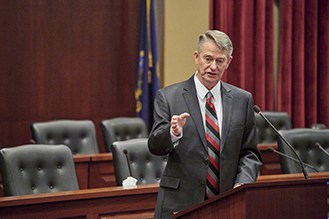


Until the Statehouse reopened in 2010, only members of legislative leadership and some Senate chairmen enjoyed private offices in the Capitol. A lucky few senators snagged shared cubicle space in the Capitol basement. House committee chairmen didn’t fare much better: All of them shared a common office suite on the fourth floor with individual closet-like partitions capable of holding a desk and maybe a chair or two for visitors. Yet, the Legislature managed to function. Legislators, including committee chairs, more often than not, conducted the bulk of their work from the chambers.
The renovated Statehouse took away the charm of a working citizen Legislature, where the public could find and observe lawmakers. Today, all senators have private offices, and so do House committee chairmen. Meanwhile, House members work from Capitol basement cubicles. That has provided House Speaker Scott Bedke an opportunity to make a play for more space on the Statehouse’s first floor.
The Legislature controls the allocation of space on the first floor. About a year ago, Bedke let then-state Treasurer Ron Crane know that he’d be evicted from his offices on the building’s first floor of the east wing.
“Our House members have long faced the challenge of cramped office and cubicle space, and the situation is becoming untenable. House members simply need more office space, both for their own use and for needed support staff,” Bedke wrote in a January 31, 2018 letter to Crane.
Crane balked; he appealing to Bedke’s respect for the building’s history. The treasurer’s office “has been located in the same space since the first original phase of the capitol was built in 1905,” Crane wrote Bedke Feb. 8, 2018.
The Statehouse was built around the treasurer’s vault, which is still in use today. The vault, as Crane mentioned, contains “the oldest and largest manganese safe west of the Mississippi river. … The safe and vault are used each day” and holds cash, surety bonds, and various securities. Bedke didn’t budge, contending that an agreement struck in 2007 to keep the capitol’s new underground wings to one story instead of two meant that the Legislature would eventually occupy the Statehouse’s entire first floor. Bedke said he waited until Crane’s retirement as state treasurer to act, out of respect.
Today, lawmakers are considering a $3.5 million appropriation to move the treasurer’s office from its historic location. Gov. Brad Little did not recommend the expenditure and Crane’s replacement, Julie Ellsworth, told legislative budget writers that she opposes the move. Both should be commended.
Whether Bedke intends it to be or not, expanding House office space to another floor of the Capitol will invite two problems, which once initiated cannot be easily solved. First, the offices will be filled by legislators and their assistants, who will quickly realize that they still don’t have as much space as they’d like, causing them to expand from the newly-acquired treasurer’s office across the hall to where legislative auditors are housed. Before you know it, the state will again be on the road to having a California-like fulltime assembly.
Second, space on the first floor will become highly coveted. It will invariably be used as a political bargaining chip, used to reward political allies with prime real estate, while punishing adversaries with less ideal accommodations in the Capitol’s equivalent of Siberia, the underground wings.
Lawmakers should reject the proposal to spend millions of dollars to expand their office space, yet some House members might be tempted to use their appropriation power to reward themselves with new space on the capitol’s first floor. Senators should be equally unwilling to authorize the House’s powerplay. But if not, Little should use his veto power to strike funding for the move, in the interest of protecting taxpayers from an unnecessary expense, and to prevent the further erosion of the state’s part-time citizen Legislature.



